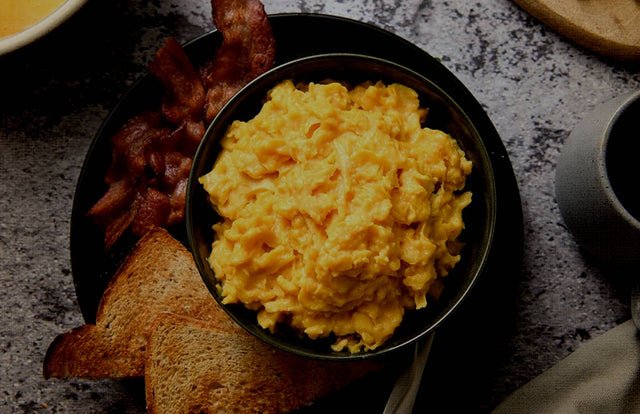Reconstituting powdered eggs involves adding water to the powder to create a liquid egg mixture that can be used in cooking or baking. The process is simple and can be done in a few steps.
- Measure out the desired amount of powdered eggs. The package should have instructions on the recommended ratio of powder to water.
- Add the powdered eggs to a mixing bowl.
- Slowly pour in the appropriate amount of cold water while whisking the mixture vigorously.
- Whisk the mixture until it is completely smooth and free of any lumps.
- Allow the mixture to sit for a few minutes to thicken.
- The reconstituted eggs are now ready to use in any recipe calling for liquid eggs.
It is important to note that reconstituted powdered eggs will not have the same texture as fresh eggs and may not be suitable for certain dishes such as poached or fried eggs. However, they can be used in baking, scrambled eggs, omelets and other dishes where the texture is not as important.
Powdered eggs have a long shelf life, and are a convenient option for people who may not have access to fresh eggs or who want to keep eggs on hand for emergency situations. They can be stored in a cool, dry place for up to 5 years or more. Check out these dried egg products.
When reconstituting powdered eggs, it is important to use cold water as hot water can cause the eggs to cook and become lumpy. It is also important to use the correct ratio of powder to water as using too much or too little can affect the texture and taste of the final product.
Lastly, it is important to note that powdered eggs are not suitable for individuals with an egg allergy or those who follow a vegan diet.
In all reality reconstituting powdered eggs is a simple process that can be done in a few steps by adding the appropriate amount of cold water to the powder, whisking it until smooth and allowing it to thicken. Powdered eggs are a convenient option for those who want to keep eggs on hand for emergency situations and have a long shelf life. However, it is important to use the correct ratio of powder to water, use cold water and note that powdered eggs may not have the same texture as fresh eggs and may not be suitable for certain dishes.
How to Use Egg Powder in Your Cooking
Egg powder is a versatile and convenient ingredient that can be used in a variety of recipes. From baked goods to sauces, egg powder can be a useful addition to your pantry. In this article, we will discuss the different ways you can use egg powder and provide tips on how to use it effectively in your cooking.
What is Egg Powder?
Egg powder is made from dried, pasteurized eggs. It is a shelf-stable ingredient that can be stored for long periods of time without refrigeration. Egg powder is available in both whole egg and egg white varieties, and can be reconstituted by adding water.
How to Use Egg Powder
Egg powder can be used in a variety of ways in your cooking. Here are a few ideas to get you started:
- Baking: Egg powder can be used as a replacement for fresh eggs in baked goods. Simply reconstitute the powder with water and use it in your recipe as you would fresh eggs. This can be particularly useful for recipes that call for multiple eggs, as egg powder is more concentrated than fresh eggs.
- Sauces: Egg powder can be used to thicken sauces and gravies. Simply reconstitute the powder with water and whisk it into your sauce. This can be a great way to add richness and depth of flavor to your sauces.
- Foaming: Egg powder can be used to create a stable foam for desserts and beverages. Simply reconstitute the powder with water, and then use a hand mixer or a stand mixer to create a foam.
- Egg replacement: Egg powder can also be used as a replacement for fresh eggs in recipes such as scrambled eggs or omelets. Simply reconstitute the powder with water and use it in your recipe as you would fresh eggs.
Tips for Using Egg Powder
- Reconstituting: When reconstituting egg powder, be sure to use the right ratio of powder to water. For whole egg powder, use a ratio of 3 tablespoons of powder to 1/4 cup of water. For egg white powder, use a ratio of 2 tablespoons of powder to 1/4 cup of water.
- Measuring: When using egg powder in your cooking, it's important to measure it accurately. One tablespoon of egg powder is equivalent to one large fresh egg.
- Storage: Egg powder should be stored in an airtight container in a cool, dry place. It can be stored for up to 2 years.
Egg powder is a convenient and versatile ingredient that can be used in a variety of recipes. From baking to sauces, egg powder can be a useful addition to your pantry. By following the tips and ideas provided in this article, you can learn how to use egg powder effectively in your cooking.
How to Make Your Own Powdered Eggs
Powdered eggs are a great alternative to fresh eggs, especially if you're looking for a long-lasting, shelf-stable option. Whether you're prepping for an emergency, going camping, or just want to have a quick breakfast on hand, powdered eggs are an excellent choice. In this article, we'll show you how to make your own powdered eggs at home, so you can enjoy the convenience and taste of fresh eggs anytime, anywhere.
Materials Needed
To make your own powdered eggs, you'll need the following materials:
- Eggs
- Salt
- Powdered milk (optional)
Step-by-Step Instructions
- Start by cracking your eggs into a bowl and whisking them until they're well beaten.
- Add a pinch of salt to the eggs and mix it in well.
- If you want, you can also add a tablespoon of powdered milk to the eggs at this point. This will help to stabilize the eggs and keep them from clumping together when they're dried.
- Preheat your oven to its lowest setting.
- Spread the eggs out onto a baking sheet lined with parchment paper. Try to make the eggs as thin and even as possible, so they dry more evenly.
- Place the baking sheet in the oven and dry the eggs for 8-12 hours, or until they're completely dry and crumbly.
- Once the eggs are dry, remove them from the oven and let them cool.
- Once the eggs are cool, grind them into a fine powder using a food processor or coffee grinder.
- Once the eggs are powdered, transfer them to an airtight container and store them in a cool, dry place.
Conclusion
Making your own powdered eggs is a simple and easy process that can save you money and provide you with a convenient, long-lasting food option. Whether you're prepping for an emergency, going camping, or just want to have a quick breakfast on hand, powdered eggs are an excellent choice. With this step-by-step guide, you can make your own powdered eggs at home and enjoy the convenience and taste of fresh eggs anytime, anywhere.












